Tuesday, September 29, 2020 / 01:45 PM / ByProshare Research / Header Image Credit: EcoGraphics
"Fiscal conservatism is just an easy way toexpress something that is a bit more difficult, which is that the size andscope of government, and really the size and scope of politics in our lives,has grown uncomfortable, unwieldy, intrusive and inefficient". -P.J.O'Rourke
Thetrouble with state finances today is not the challenge of revenue decline, lowcapital expenditure and annual recurrent cost increases, these issues are takenas given and represent recurring constants in the government's equation offiscal management. Indeed, these issues are junior to the bigger problems of imagination,strategy and execution. Every great human endeavour is a productof a mind or a collection of minds committed to thinking beyond the ordinary, amind or collection of minds prepared to tackle ordinary problems inextraordinary ways. If states must navigate past the problem of the novelcoronavirus pandemic (COVID-19) and its multiple socioeconomic challenges, theymust begin to see the big picture as they prepare for fiscal resets and economicrealignments. States must begin to adopt fiscal frameworks primed to grow theeconomy of tomorrow and not the economy of yesterday. We note that governanceis not easy but it is also not rocket science. For a government to besuccessful in a period of a global trade and health crisis it cannot afford tobe stuck with the issues of yesterday, it must be prepared to address theissues of the future because the future is here.
Wemust begin to understand and appreciate the importance of the principle ofmeasurement in economic management. We must understand that what cannot bemeasured cannot be planned and what cannot be planned cannot be achieved. Inmore developed climes the lifeblood of governance is centred on data gathering,data processing and data analysis, these processes funnel into the more visibleacts of policy formulation and execution. In the United States ofAmerica, for example, the Congressional Budget Office (CBO) provides a streamof data that enables citizens to assess how well municipal, state and nationaleconomies fare. The apolitical nature of the CBO creates confidence andestablishes the credibility of the governments actions in the minds ofcitizens.
In God We TrustEverything Else Is Data
Thedata provides citizens with a set of empirical references that build deepconfidence in the process of governance. Regular and accurate data provided atscheduled periods make the citizens aware of not only the government's plansbut also provides a nexus between citizen's responsibility and the government'sobligations. If citizens desire omelets then they realize that they mustbe prepared to break eggs. Or if people desire a meal of pounded yam, they mustbe prepared to befriend the pestle and mortar. However, trouble startswhen the citizen's eggs (i.e, taxes) result in audio (or phantom) omelets orwhen the citizen's yams, do not feel the pounding beat of a pestle doingjustice to the bottom of a mortar.
Dataestablishes a sense of equity and the more the sub-national governments rely ondata as modes of citizen engagement, the greater the trust that is establishedbetween the governed and the governing.
BudgITthrough its annual State-of-the-States reports creates a framework forobjective and enlightened interaction between taxpayers and tax managers.Indeed by providing comparative budget data across sub-national entities orstates, BudgIT offers a platform for citizen's assessment of the fiscalperformance of those they elected to public office. A governor and his or her governmentare as good as the value they add to the average lives of the citizens withintheir states. The measure of the worth of a governor of a state is the measureof his or her efforts at fiscal stability, secular growth in gross domesticstate product, and the improvement in social capital per head.
Thisis brought to life by a quick review of the key findings of BudgIT's 2020State-of-the-States report. The report notes as follows:
- The total debts of the states in 2019 rose by 162.87% to N3.3trn. This means that state government budgets have been increasingly funded by local and foreign debts and state finances have required increasingly larger amounts of financial leverage. Is this good or bad? Well, it depends. If a state government's revenue (particularly its internally generated revenue (IGR)) can cover recurrent expenditure and equally meet at least 50% of its capital needs, then leveraging the states expected future cash flows may be a smart fiscal manoeuvre to speed up growth and provide critical infrastructure at a reasonable cost, however, if a state appears to be struggling to meet its recurrent expenditure and decides to borrow heavily to cover its regular operational and capital costs, then the outcome could be very unpleasant. Like an ostrich with its head buried in the sand, a state with a heavy debt overhang leaves its rear vulnerable to being kicked very hard by harsh economic realities. If the debt obligations of states were fairly high pre-COVID-19, then in 2020 the financial leverage of Nigeria's largest sub-national entities, the states, is bound to get worse. BudgIT's figures of the debts of states in 2019 give little if any warmth.
Illustration 1 Eyeing State's Domestic Debt Monster H1 2020
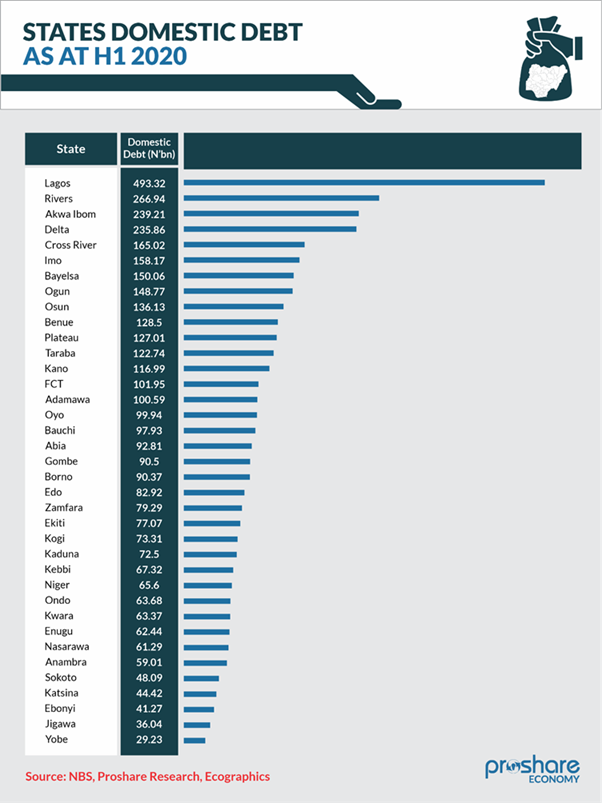
Illustration 2 Eyeing State's ForeignDebt Beast H1 2020
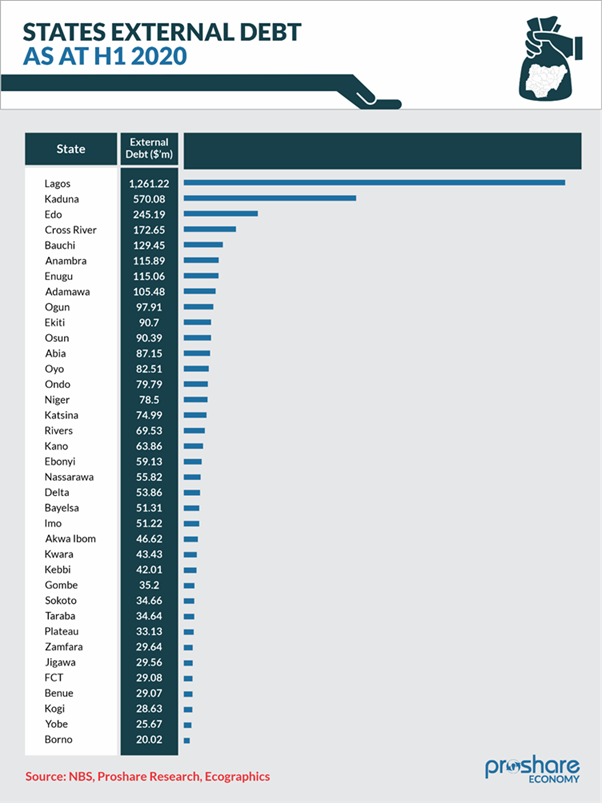
- BudgIT's State-of-the-States 2020 report notes that several states have seen their overhead costs spiral. State's like Ekiti, Kogi, Kano, Plateau, Kwara, Taraba, Adamawa and Benue have witnessed relatively high recurrent costs to revenue ratios. Most recurrent expenditures represent overhead expenses that generally speak to the relatively high ratio of public servants to the state's overall labour force. This brings about subnational policy dilemmas that are made worse by pandemics such as COVID-19. A high public-sector labour force requires high fiscal commitments to recurrent spending to the detriment of capital spending which would drive private-sector enterprise and provide more government revenue, faster-paced industrial development, upgrading of human capital skills and the deepening of domestic industrial value chains.
- The five states that topped the 2020 State-of-the-States report on its Fiscal Sustainability Index were: Rivers state, Anambra state, Ogun state, Lagos state and Kano state. So, maybe we should ask the question; what do all these states have in common? The answer appears to be that they are all key economic hubs. Each state demonstrates a competitive and strategic advantage either in the oil and gas sector (Rivers state), commerce and services (Lagos), manufacturing and processing (Anambra and Ogun states) or manufacturing and agricultural produce (Kano state). The dominant presence of these sectors within the respective states mentioned provides large and unique economic multipliers that are yet to be optimally explored.
- The BudgIT 2020 report on Nigerian states highlights five states with notable foreign debt portfolios. At a time of COVID-19 and with oil prices crawling between a US$40 per barrel and US$45 per barrel price band, the outlook for the naira to foreign currency exchange rate is dim. This means that states with high foreign debts would have to repay the loans with larger naira income than was planned at the time the debt was contracted thereby putting added pressure on state finances. The five states with the highest foreign debt budgets were Lagos (US$1.5bn), Kaduna (US$554.7m), Edo (US$275.92m), Cross Rivers (US$208.96m), and Bauchi (US$133.9m).
Illustration 3 Narrowing The View on Subnational Challenges
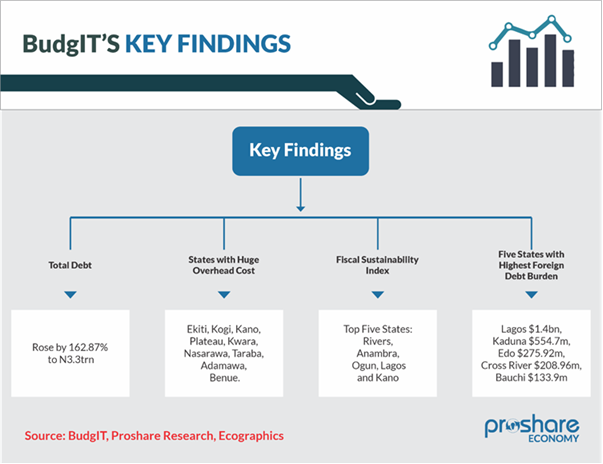
Bringing LGAs Into Play
StateGovernments have been ambivalent about the fiscal status of local governmentswithin their states. The average local government authority has been treated asa convenient nuisance; convenient for federal revenue allocation but a nuisanceconcerning their usefulness as units of fiscal administration. LGAs must beconsidered as important parts of the country's fiscal architecture they shouldnot be allowed to hide behind the finger of their state budgets. This unit ofadministration must be held accountable and should attract as much attention asstates. Indeed, we believe that BudgIT should prepare itself for a deep diveinto the State of State LGAs. Accountability should be as much abottom-up affair as it is a top-down one. Therefore, hopefully, in BudgIT'snext report on the states, we would like to see the relative financialpositions of a selected number of LGAs if not all the LGAs in the country. Orperhaps, BudgIT could opt for a separate report on LGAs, which would have apowerful effect on improving the quality of governance at the grassroots wheremost citizens make their daily living.
Wenote that all too often analysts, commentators and citizens generally tend toconcentrate on the condition of the federal government's budget rather than thebudgets at the everyday levels of living which is the budgets of thesub-nationals or states and local governments which are just as important thanthe federal fiscal balance.
Running out of Time and Ideas
Withthe coronavirus pandemic terrorizing global economies frontier nations likeNigeria are running out of time and unfortunately they are equally running outof ideas. But extraordinary times require extraordinary measures, in the wordsof Albert Einstein, we cannot solve a problem at the same level of thinkingthat created the problem in the first place, in other words, we need newparadigms. The nature of the fiscal realities of Nigerian states in an era of aglobal health pandemic and lower international oil prices would require deeperthinking and more aggressive action. Businesses within states will experiencerevenue meltdowns in the year with their profits disappearing. This would leadto lower tax revenues and higher levels of unemployment as businesses collapse.The consequence of failing private enterprises would be that states from 2020will see their debts rise as the means to repay loans vanish. There will bevery few if any federal fiscal support schemes by way of state financialbailouts or federal loans in 2020 as the tight financial position of thefederal treasury itself would make this impracticable. The fiscal supportstructures put in place by the federal government in 2016/2017 to help stateswith their financial difficulties cannot be repeated any time soon. In factfrom the year 2020, the federal government will have to deal with the fiscaldemons of its own.
Thinking Outside The Traditional Box
Towriggle outside the problems states will need to be imaginative, creative andstrategic. A few things states might need to do would include:
- Generate liquidity by liberating idle assets. Many states have some projects that have been abandoned but might be considered attractive to private sector investors. The projects could be sold to private interests on the best cost-recovery basis.
- States could encourage companies to support infrastructural development projects by constructing the infrastructure and compensating investors with tax credits which they can charge off against present and future tax obligations.
- States could ignite economic activity by removing obstacles to business growth in their respective territories. In some states the simple control of non-state actors that collect different levies and tolls could bring down the cost of doing business in their states, this would reduce product prices and service costs thereby facilitating faster state GDP growth which in turn would improve the state's IGR. For states that depend heavily on federal funds (FAAC) for survival the ease of doing business and the stimulation of the state's domestic economy is crucial. As federal revenues decline on the back of lower oil earnings the size of the monthly FAAC distribution will decline and this would cause major fiscal challenges for states with low IGR. In other states what may be needed is rethinking, reimaging and restrategizing. This could hold for Lagos state (see illustration below).
Illustration 4 Lagos; Reimagining TheFuture
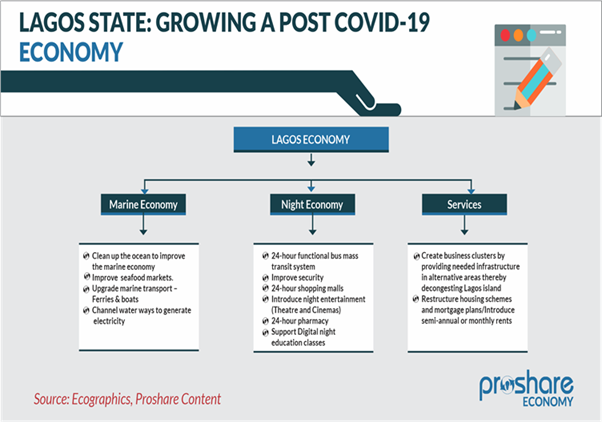
Illustration 5 The Facts About FAAC 2019
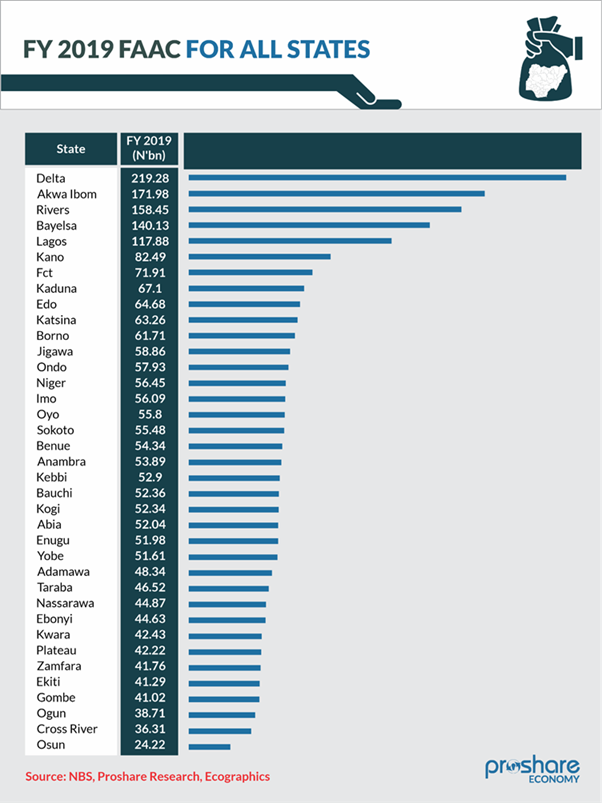
- States could also decide to identify core sectors of their economies and categorize them as 'lead' sectors. These lead sectors would be handled within a project management framework with stated objectives carried out within specific timelines and in partnership with public and private sector team leaders who provide the modelling framework with which the sectors would be expected to operate. The team leaders would be in charge of managing the resources, monitoring progress and reporting on the divergence between goals and actual performance. The essence of this approach is to change the template for growth models adopted by states in the past. The new model would be actionable based on the use of big data, informatics, artificial intelligence (AI) and machine learning. Within this arrangement data must be 'open source' to the managers and the traditional secrecy of bureaucracy will have to be jettisoned.
Takeaways/Endpoints
TheBudgIt's report yields up some key takeaways which would include but would notbe limited to the following:
- States cannot be allowed to borrow without guidelines and limits to protect the solvency of these subnational entities. A few states could be considered technically bankrupt and if they were private commercial institutions, they would have been wound up. Considering the fiscal status of some states the challenge that needs to be urgently addressed under a period of COVID-19 is the contemplation of Murphy's law that states that what has gone bad could get worse. To prevent this ugly outcome all states need to rethink their fiscal positions and realign their budgets with the exigencies of the time. The pork-barrel spending some states have become accustomed to must give way to stricter governance. Should we be talking about expenditure cuts in a recession? Unfortunately yes, although it sounds counterintuitive, it is inevitable if some states are to avoid dire socioeconomic outcomes.
- States must prepare for unforeseen circumstances or black swans (which are unknown unknowns) like COVID-19 and prepare for grey swans (which are known unknowns) such as poor weather conditions (floods) and the likely consequences of poor harvest on food security in 2020.
- Another takeaway is that BudgIT may need to integrate sensitivity analysis into its future reports. The sensitivity data would tell us what would likely happen if the Lagos State government's revenue expectation slips by 20%, how would it affect the state's budget balance? Although BudgIT's reports are usually after the fact, for example the 2020 report addresses 2019 data, nevertheless sensitivity analysis would still give us a sense of near fiscal misses or actual fiscal triumphs compared to what could have happened given sensitivity analysis assumptions.
- The fiscal regulatory environment needs to be made clear, concise and consistent. There is still a whole lot of problems with the transperancy of state budgets.
Download Power Point Presentation Here
Related News - State of States Reports
- 2020 State of States Report: Osun, 12 Others Lack Revenue Capacity to Fund Recurrent Expenditure
- PDF: State of States 2019 Edition
- State of States 2018 - Lagos Dropped From 2nd to 4th Place on The Fiscal Sustainability Index
- Rivers Now the State of States
Related News - State andLocal Govts
- Reluctance to Lend to State Governments - Sep 28, 2020
- Stakeholders Urge Sub-Nationals To Rethink Strategies for Fiscal Sustainability - Sep 25, 2020
- FAAC Payout Well Short of States' Needs - Aug 28, 2020
- RMAFC Emphasise Need for Sub-nationals to Improve IGR - Aug 27, 2020
- Unemployment - Sub-Nationals in Focus - Imo State Records Highest Unemployment Rate of 48.7% - Aug 21, 2020
- Heavy Weight of State Government Debt - Aug 11, 2020
- IGR Still in Need of a Boost - Jul 03, 2020
- Coronanomics (18) - Selected Sub-Nationals: The Different Faces of Trouble and Redemption - Jun 24, 2020
- Coronanomics (17) - Sub-Nationals: Digging Deep, Wide and Hard - Jun 23, 2020
- No Respite for State Government Finances - Jun 11, 2020
- Accessing the Needed Liquidity from State Owned Assets in the Face of Current Economic Realities - Jun 08, 2020
- N1.33trn Generated As IGR in 2019 - NBS - May 22, 2020
- FSDH Group to Engage 3 Nigerian Governors in a Webinar Session on May 22, 2020 - May 18, 2020
- FSDH Becomes first Merchant Bank Enlisted in the Lagos State EBS-RCM for Revenue Collection - May 17, 2020
- States Need To Re-Strategize IGR And Industrialization During and Post COVID 19 - Teslim Shittabey - Apr 17, 2020
- Mounting Fiscal Pressures on the States; FAAC Payout Amount to N582bn in March 2020 - Apr 17, 2020
- State Governments: Another Cycle of Non-Payment of Salaries to Begin Soon - Apr 09, 2020
- CoronanomicsWatch: LGAs Have A Key Role In Containing COVID-19 In Nigeria - John Wesey - Apr 09, 2020
- Ondo State Govt Nominates Kayode Falowo as Chairman for COVID-19 Response Fund Committee - Apr 03, 2020
- Fragility of State Government Finances - Mar 24, 2020
Proshare's Memo to The Market and Reports
- NSE Ten Years After a Takeover: The Good, The Bad and Undecided - Sep 16, 2020
- Online Trading Ranking Report 2020 - Trading in a Period of a Virus; Building Good Habits - Sep 02, 2020
- Otudeko: A Boardroom Revolutionary at 77 - Aug 18, 2020
- Roads: Concrete Vision, Asphalt Competition, Looking Ahead - Aug 01, 2020
- CEO Remuneration 2020 Report - Paying the CEO in a Pandemic; The Unanswered Questions - Jul 30, 2020
- Memo To AMCON: Nigerian Tax Payers are not Responsible for Repayment of Bad Debt - Jul 23, 2020
- Coronanomics (1) - Understanding the Realities of an Impending Recession - Jun 06, 2020
- Nigeria Cement Market's New Chess Play; Understanding The Market Dynamics - Jan 31, 2020
- NCM2020 - Fin. MKT in Transition: Understanding Past Uncertainties; Preparing for New Possibilities - Jan 20, 2020
- UBA's Staff Layoff; Understanding The Shifting Dynamics Of Banking's Future - Jan 20, 2020
- Ogun State: Working Past Economic Headwinds - Nov 04, 2019
- Banks' H1 2019 Numbers: Top Line Growth, Bottom Line Uncertainty - Sep 22, 2019
- Ecobank Nigeria: The Case For Restructuring, Repositioning and Retooling - Jul 31, 2019
- CEO Remuneration: Making Sense Of The Numbers For Listed Companies In Nigeria - Jul 12, 2019
- Beyond The Noise: MTN's Post Listing Reactions, Gaps in Rules and Lessons Learnt- May 26, 2019
- JUMIAs IPO and Q1 2019 Result; Understanding The Numbers and Ignoring the Noise - May 16, 2019
- Ogun State: The Debt Trap- Leaning Against the Wind - April 2019
- The National Association of Securities Dealers (NASD) OTC Market Report 2018 - Feb 06, 2019
- Surviving Uncertain Times in the Nigerian Financial Market - Jan 19, 2019
- Unravelling The Ecobank Q3 2018 Results; Applying NAFEX, Different Outcomes Oct 26, 2018
- Compliance With IFRS IAS21 - ETI and The Effects of Changes in Foreign Exchange Rates - Oct 25, 2018
- Nigerian Banks' Performance - H1 2018 - Sep 26, 2018
- Swift Correction Of Honest Mistakes Helps Build Institutional Corporate Governance - Sep 05, 2018
- Memo To The Market - The NSE, Oscar Onyema Foundation And Corporate Governance - Aug 20, 2018
- AMCON and Financial Services Debt Burden in Nigeria - Aug 17, 2018
- Memo to The Market: The Oando Corporate Journey - At The Regulators Gate - Dec 10, 2017
- Leadership, Change and Corporate Transformation - The Nigerian Experience ... - Proshare Nov 07, 2017
- Analysing the H1 2017 Performance of FBNHoldings Plc - A Comprehensive Report - Oct 20, 2017
- FBNHoldings Plc Q1' 2017 Performance Assessment Report Updated - Sep 25, 2017
- Years After - 5 years of Dr. Yemi Kale's Stewardship at the NBS - Aug 24, 2016
- Memo to the Market: Reappointing Arunma Oteh as DG, SEC - Jan 03, 2015
- Where Nigeria got it Wrong - Proshare Dec 01, 2014
- Fundamental Considerations for Capital Market Reforms in Nigeria ... - Proshare - Sept 06, 2010
- The Bull in the China Shop - A New Paradigm in the Nigerian Financial Markets? - Aug 21, 2009
- Making Money in The Nigerian Capital Market Report - Apr 25, 2009
 Lagos, NG • GMT +1
Lagos, NG • GMT +1










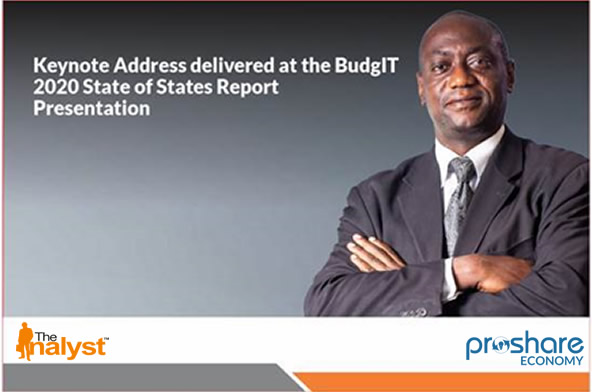
 2476 views
2476 views






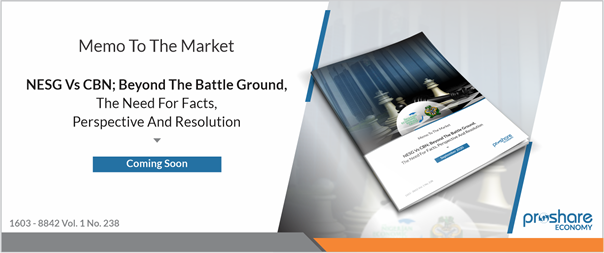

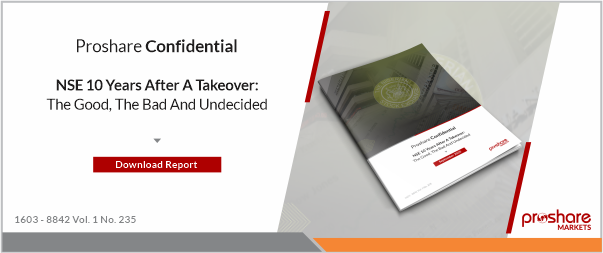





 Sponsored Ad
Sponsored Ad
 Advertise with Us
Advertise with Us









